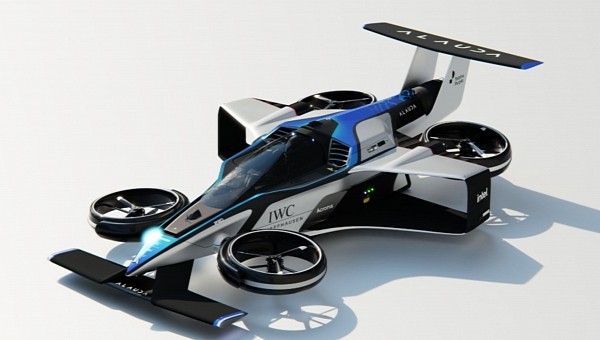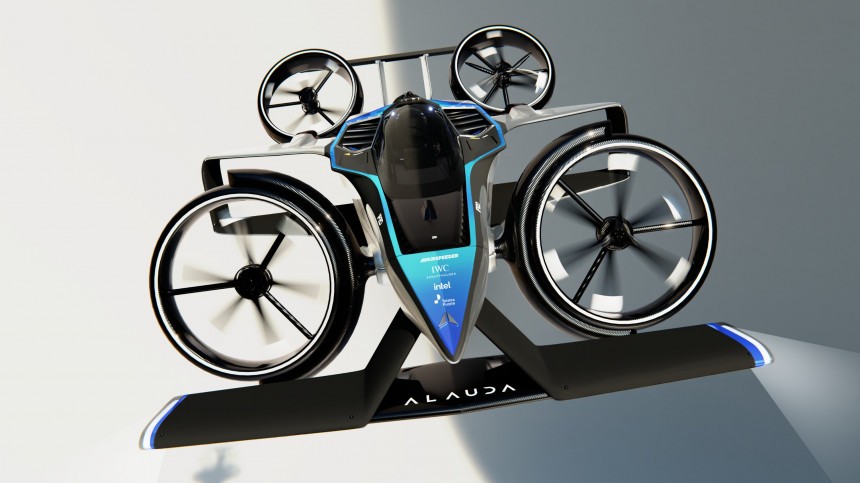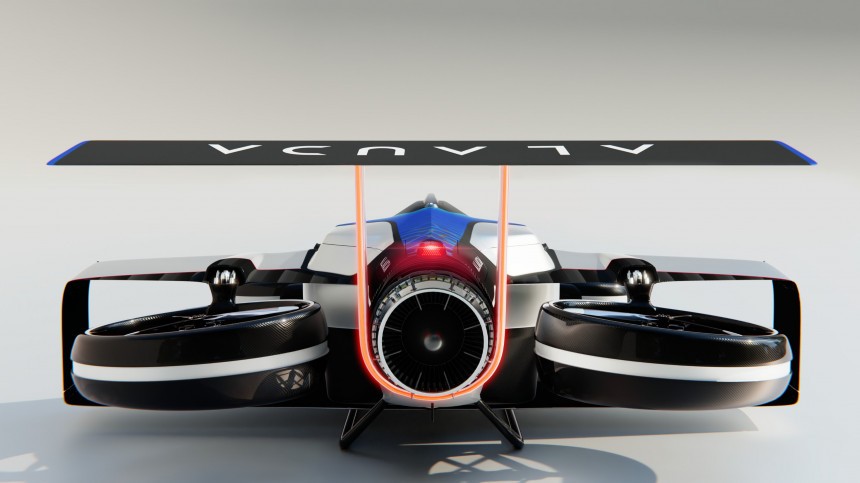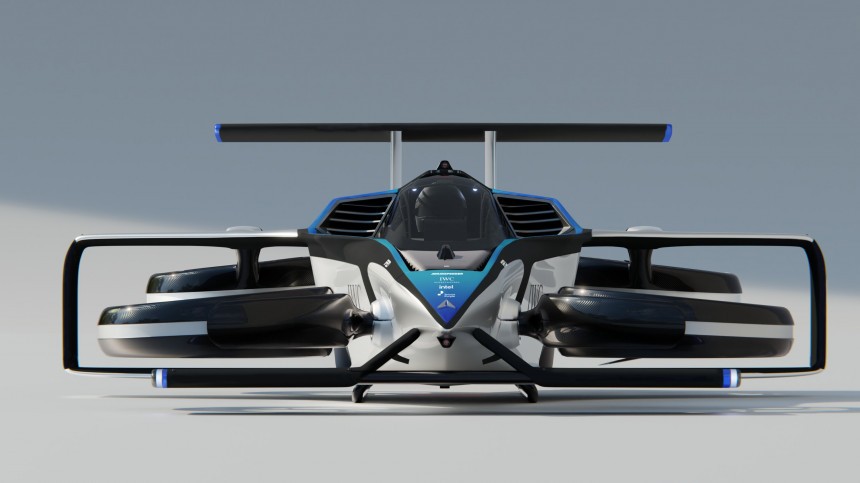Just a little while ago, flying cars were considered a sci-fi concept. With technology rapidly evolving, we’re closer than ever to seeing flying vehicles. Why not take it even further and make them race? Well, that’s what Alauda Aeronautics is doing – the company has just unveiled the Airspeeder Mk4, the first crewed version of its flying racing car.
Alauda Aeronautics is based in Adelaide, South Australia – its purpose is to deliver on the dream of flying cars that anyone can own and fly, all while keeping sustainability in mind. But before going full commercial, the company decided to seize the opportunity to organize a racing series with its vehicles, thus attracting more attention and investments, which in turn accelerates growth and innovation.
And that’s how the Airspeeder racing series emerged. Alauda Aeronautics first unveiled the remotely-piloted Airspeed Mk3, which so far has successfully completed over 350 test flights and took part in two Airspeeder demonstration races last year.
Today, the company announced the Airspeed Mk4, the world’s fastest electric Vertical Take-Off and Landing (eVTOL) aircraft – it will be publicly unveiled at the Southstart innovation festival on March 7.
The Airspeed Mk4 looks like a high-performance racing drone had a baby with a Formula 1 car. It features a complex electric propulsion system and carefully optimized aerodynamics. It can reach an impressive top speed of 360 kph (224 mph) in only 30 seconds from a standing start.
Not only is the Mk4 really fast, but it also boasts a surprisingly long range. The company claims it has a projected range of 300 km (188 miles) – its takeoff weight (MTOW) of just 950 kg (2,094 lb) definitely helps it achieve this feat.
In order to be used in racing, Alauda Aeronautics had to engineer the Mk4 for maximum agility at high speeds and low altitudes. And they have done precisely so using two technologies inspired by the space industry: a hydrogen turbogenerator and an AI gimballed thrust.
The 1,000 kW (1,340 horsepower) turbogenerator is the core of the Airspeeder Mk4, feeding power to the batteries and motors. It’s been specifically engineered for use in eVTOLs and can run on green hydrogen fuel.
Hydrogen is already being used in various industries, but it has significant potential in the future of aviation, specifically personal urban air travel. Because of its high energy density, it can be stored in a lightweight, compact form, ideal for small aircraft. Furthermore, it’s non-toxic and produces no emission besides pure water.
Alauda Aeronautics’ demonstrator ‘Thunderstrike’ engine features a unique combustor produced via 3D printing techniques developed in the space industry for rocket engines. It’s designed to keep the hydrogen flame temperature low, thus reducing nitrous oxide (NOx) emissions.
Most eVTOLs use tilt-rotors to steer – they align vertically for takeoff and landing and move to a horizontal position for cruising. The Mk4 utilizes more advanced equipment – it’s fitted with a unique gimballed thrust system. An AI (Artificial Intelligence) flight controller adjusts each of the four rotor pairs mounted on lightweight 3d-printed gimbals. This allows the Mk4 to maneuver with extreme precision, an essential feature in close-action racing. Moreover, it enables it to be fast in a straight line. The company compares its handling to a jet fighter or a Formula 1 racing car.
Matt Pearson, the CEO of Alauda Aeronautics, said that the company is ready for crewed flying car racing. The vehicles have been built, the venues have been secured, and the sponsors and technical partners are on board. The last step is having an innovative and ambitious automotive brand take part in the series. Alauda Aeronautics is seeking OEM partners to join the motorsport revolution.
Of course, this is just the beginning for the company. It would be a mistake to see it as just a show of speed and skill. The series will serve as a testing ground for sustainable green propulsion systems, and the company will surely obtain lots of insights regarding its technologies. But the ultimate goal is to change how we all travel in the future, as Alauda Aeronautics sees a substantial market for private flying cars in the near future.
Pearson compares the future evolution of eVTOLs to the one in conventional aerospace. He explained that there are about as many private jets in operation as there are commercial jets – Pearson believes it could be the same with flying cars someday, with a similar number of commercial taxis and private vehicles. He also said a significant shift would happen once flying cars go for the same price as a Tesla.
If you’re intrigued by all this, luckily, you won’t have to wait an eternity for the debut of the Airspeed racing series. Alauda Aerospace plans on starting flight testing for the Mk4 chassis and powertrain in the first quarter of this year, as well as the first crewed flights of the airframe. If all turns out well, the Airspeeder Racing Championship is scheduled to begin in 2024.
And that’s how the Airspeeder racing series emerged. Alauda Aeronautics first unveiled the remotely-piloted Airspeed Mk3, which so far has successfully completed over 350 test flights and took part in two Airspeeder demonstration races last year.
Today, the company announced the Airspeed Mk4, the world’s fastest electric Vertical Take-Off and Landing (eVTOL) aircraft – it will be publicly unveiled at the Southstart innovation festival on March 7.
The Airspeed Mk4 looks like a high-performance racing drone had a baby with a Formula 1 car. It features a complex electric propulsion system and carefully optimized aerodynamics. It can reach an impressive top speed of 360 kph (224 mph) in only 30 seconds from a standing start.
In order to be used in racing, Alauda Aeronautics had to engineer the Mk4 for maximum agility at high speeds and low altitudes. And they have done precisely so using two technologies inspired by the space industry: a hydrogen turbogenerator and an AI gimballed thrust.
The 1,000 kW (1,340 horsepower) turbogenerator is the core of the Airspeeder Mk4, feeding power to the batteries and motors. It’s been specifically engineered for use in eVTOLs and can run on green hydrogen fuel.
Hydrogen is already being used in various industries, but it has significant potential in the future of aviation, specifically personal urban air travel. Because of its high energy density, it can be stored in a lightweight, compact form, ideal for small aircraft. Furthermore, it’s non-toxic and produces no emission besides pure water.
Most eVTOLs use tilt-rotors to steer – they align vertically for takeoff and landing and move to a horizontal position for cruising. The Mk4 utilizes more advanced equipment – it’s fitted with a unique gimballed thrust system. An AI (Artificial Intelligence) flight controller adjusts each of the four rotor pairs mounted on lightweight 3d-printed gimbals. This allows the Mk4 to maneuver with extreme precision, an essential feature in close-action racing. Moreover, it enables it to be fast in a straight line. The company compares its handling to a jet fighter or a Formula 1 racing car.
Matt Pearson, the CEO of Alauda Aeronautics, said that the company is ready for crewed flying car racing. The vehicles have been built, the venues have been secured, and the sponsors and technical partners are on board. The last step is having an innovative and ambitious automotive brand take part in the series. Alauda Aeronautics is seeking OEM partners to join the motorsport revolution.
Of course, this is just the beginning for the company. It would be a mistake to see it as just a show of speed and skill. The series will serve as a testing ground for sustainable green propulsion systems, and the company will surely obtain lots of insights regarding its technologies. But the ultimate goal is to change how we all travel in the future, as Alauda Aeronautics sees a substantial market for private flying cars in the near future.
If you’re intrigued by all this, luckily, you won’t have to wait an eternity for the debut of the Airspeed racing series. Alauda Aerospace plans on starting flight testing for the Mk4 chassis and powertrain in the first quarter of this year, as well as the first crewed flights of the airframe. If all turns out well, the Airspeeder Racing Championship is scheduled to begin in 2024.





















